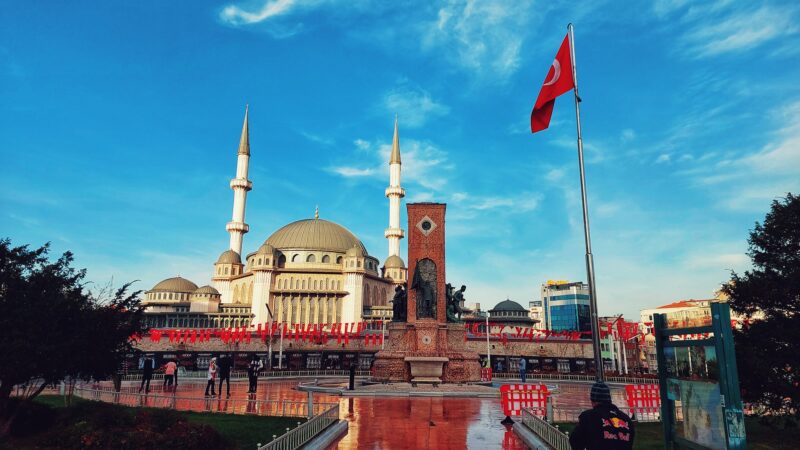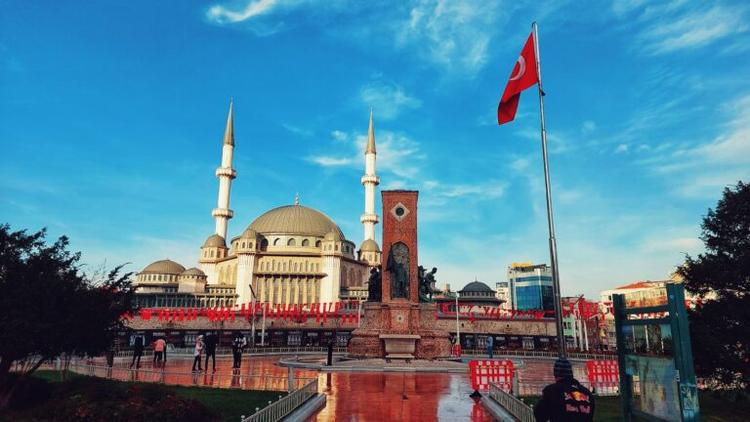The future of Turkey and its citizens is at stake.
( Globalvoices.org) – May 14 will go down in the history of Turkish Republic as one of the most important elections to date. The stakes are high, and there is a growing sense among the general public that if the current leadership stays in power, the country’s future is grim and uncertain. There is talk of Turkey turning into a Taliban-style theocracy, while others debate whether the country can weather even one more term under the current autocracy. The importance of the upcoming elections rests on the ruling party of Justice and Development (AKP), which has upended democratic norms and values in recent years. Under the AKP, Turkey has curtailed freedom of expression, media plurality, human rights, art and music, women’s rights, and more, largely at the whim of one man — President Recep Tayyip Erdoğan. After twenty years in power and consecutive election victories (two presidential races, three referendums, five parliamentary elections, minus the municipal elections in 2019) since 2002, the fate of the ruling party and its leaders is on the table, but so is the future of Turkey and its citizens.
Candidates, alliances, legions
Embed from Getty Images
ISTANBUL, TURKIYE – APRIL 09: Turkish President Recep Tayyip Erdogan attends the Pendik Municipality Mass Opening Ceremony in Istanbul, Turkiye on April 09, 2023. (Photo by Serhat Cagdas/Anadolu Agency via Getty Images)
As of March 28, there are four presidential candidates in the race (out of 18 original applicants). In Turkish elections, various political parties often form alliances with each other to consolidate their voter base. The four candidates are incumbent President Recep Tayyip Erdoğan (despite the earlier claims that his candidacy was unlawful) representing the ruling People’s Alliance; Kemal Kılıçdaroğlu, the candidate from the united opposition front (known as Table of Six) representing the Nation Alliance; Muharrem Ince (former member of the main opposition Republican People (CH) party and 2018 presidential candidate) from the Homeland party; and Sinan Oğan representing the ATA Alliance.
The People’s Alliance has gotten both official and unofficial support from nationalist parties, the ultra-Islamist Kurdish Free Cause Party (Huda-Par), also known as the successor of Hezbollah, as well as parties known for their anti-LGBTQ+ stance and questionable views on women’s rights. For instance, one supporter, the New Welfare Party called to amend Law 6284 on the prevention of violence against women and children and close down LGBTQ+ clubs in the country. According to journalist Ismail Saymaz, the party had some 30 conditions prior to throwing its support behind the ruling alliance.

Image by Reza Ghasemi. Free to use under Unsplash license.
Imprisoned former co-leader of the pro-Kurdish Peoples’ Democratic Party (HDP), Selahattin Demirtaş described the coalition as a “kind of Taliban alliance” in an article he penned from jail. Writing for an online news platform Arti Gelecek, Demirtaş warned that the current alliance is the “most right-wing and the most reactionary bloc in the political history of Turkey.” He added that if they win, it is likely the last election in which women could vote “because the Taliban Alliance will roll up its sleeves to usurp the rights of women.”
On the other end is the multi-faceted Nation Alliance. They promise to bolster Turkey’s parliamentary system, establish limits on presidential powers, and plan to address economic and societal grievances. The alliance is supported by at least another three political parties who did not join the alliance officially but have expressed support.
Another party with a significant voter base, the Peoples’ Democratic Party (HDP), announced they were not planning on nominating a candidate but, rather, would join forces with other progressive parties to get rid of the current administration. “We will fulfill our historical responsibility toward the one-man rule in the presidential elections,” said Pervin Buldan, the HDP co-chair.
The move was seen as a “major boost to Kılıçdaroğlu’s electoral chances against Erdoğan,” wrote journalist Ezgi Akin for AlMonitor. The party’s voter base, which makes up some 6 million supporters — 10–13 percent of the total vote count — can play a key role in gathering support for Kılıçdaroğlu just as they did during the municipal elections in 2019. Speaking to AlMonitor, associate professor of political science at Istanbul’s Sabanci University Berk Esen said this was “a very critical move. Following this statement, a bloc vote of at least eight or nine points will go to Kılıçdaroğlu.”
It is unclear what Ince, who is running against the president for a second time, represents. In an interview with AFP, analyst Serkan Demirtas said, “[Ince] says he’s against Erdoğan, and he’s also against Kılıçdaroğlu, but what does he represent? We don’t know.” What is known, however, is that Ince’s bid in the race would likely serve Erdoğan as Ince is “unlikely to steal from the ruling party’s votes,” according to journalist Deniz Zeyrek and instead lure in the potential voters from the main opposition alliance according to Emre Perek, of Eurasia Group. So far, Ince has made a name for himself for his dance moves which have become a social media phenomenon. In an interview with AFP, Berk Esen said, “he seems to be especially popular with Gen-Z voters who can be easily swayed by anti-status quo candidates.”
On March 29, Kılıçdaroğlu had a meeting with Ince, who told journalists after the meeting that he was determined to stay in the race.
In total, 36 political parties were officially approved for the May 14 election, as voters will not only be choosing the next president but also the lawmakers. Two additional alliances, the Labor and Freedom Alliance and the Socialist Union of Forces, will run for the parliamentary seats. Although neither of these two alliances nominated individual presidential candidates, both expressed support for the opposition Nation Alliance. Turkey’s parliament, the Grand National Assembly, consists of 600 seats. Currently, the ruling party and its ally, the Nationalist Movement Party (MHP), hold the majority.
The stakes
Before Turkey was hit with a devastating earthquake on February 6, chances for Erdoğan’s re-election and his coalition maintaining a majority in the parliament were rather high. The earthquake, however, changed the game, exposing the grave consequences of one-man rule, the weakened institutions, the extent of corruption, and the government’s inability to swiftly intervene during a crisis — all as a result of Erdoğan’s twenty years in power.
Kılıçdaroğlu, who was the first party leader to visit the earthquake provinces accused both president and the ruling party of exacerbating the destruction and failing to prepare in a video message following his visit.
There is also economic instability as the country battles rampant inflation while Turks are facing a cost-of-living crisis. In a bid to sway votes in its favor, in March, the ruling party announced its decision to raise the monthly minimum pension to TRY 7,500 (USD 391) from TRY 5,500 (USD 260), a move that will cost state coffers TRY 150 billion (USD 7 .86 billion) according to reporting by Reuters. In December 2022, minimum wages were also increased to TRY 8,500 (USD446), a third such increase in 2022. Millions of Turks were also made eligible for early retirement in another face-saving measure. But none of these measures are sustainable. Speaking to The Economist, Selva Demiralp of Istanbul’s Koc University, said, “They’re trying to sustain the current system until the elections, before it blows up.”
There is plenty of foreign policy trouble too. As Elçin Poyrazlar wrote in his most recent Politico column, the incumbent’s departure would be a relief for an “increasingly frustrated” West. “In the past months alone, Turkey has quietly provided Russia with clandestine trade routes to beat sanctions, imposed a veto on Sweden’s entry into NATO and engaged Greece in high-risk brinkmanship with fighter jets over the Aegean.”
The opposition and independent civil society watchdogs expect voter fraud in the upcoming election. This is especially a problem in the areas hit by the earthquake. “We need to know how the ballot boxes and voters’ lists from the earthquake region will be organized,” said an opposition CHP official in an interview with Politico. Some 3.3 million people are estimated to be displaced as a result of the earthquake. This concern makes the security of the ballot even more pertinent. As one political researcher told Politico, “Kılıçdaroğlu is not only competing against Erdoğan but also against the state’s security, judiciary, and financial apparatus under his control.”
In addition to the security of the ballots and the fate of millions of displaced voters from the earthquake provinces come May 14, the overall transparency of the election is at stake.
With the unchecked powers vested in the ruling government, its ruling Justice and Development party may not even need conventional corruption tools of ballot stuffing or incorrect tallying. It has election officials in its pocket and the media too, thanks to the new online censorship and disinformation laws. In 2019, during the municipal elections, election officials attempted to overturn the results of the Istanbul mayoral race after the ruling party lost its seats to the opposition candidates. The re-run of the election resulted in another defeat for the ruling party, with Ekrem İmamoglu winning the election for a second time.
In its 2023 World Report, the international human rights watchdog Human Rights Watch said, “Turkey’s government has increased its censorship powers and targeted perceived critics and opponents with bogus criminal proceedings and prison sentences in advance of 2023 presidential and parliamentary elections.”
Following the devastating earthquake, the ruling government also did not shy away from censorship in order to save face amid growing criticism. It is also not clear how millions of university students who were forced to switch to online education as part of the government measures introduced after the earthquake will cast their votes. If universities re-open and students return to their campuses, it may be difficult for them to return to their home districts where they are registered to vote ahead of election day — especially given increased travel costs. The Council of Higher Education (YÖK) is yet to announce whether universities will re-open for face-to-face education come April. Officially the deadline to make changes to the address is April 2, but a lack of clarity from YÖK has left students undecided about whether to change their residency addresses or not.
“Spring will come again”
This is what Kılıçdaroğlu promises in his new campaign video that draws attention to a number of issues the country struggled with in the past years and months. For instance, in one of the segments, there is the campus of Boğaziçi University, which has been protesting the appointment of the government trustee as the rector for over two years now. There are also references to football stadiums that have recently come under scrutiny as well as performances by artists. “We are coming for a Turkey that can sing its most beautiful songs loudly and whose joy can be seen in the eyes of its children. I promise you that spring will come again. Mr. Kemal will not break his promise,” Kılıçdaroğlu vows in the video. With a little more than forty days left and Turkey weathering an unseasonably cold winter, it is not just good weather people are looking forward to but also a new political chapter to mark the beginning of spring.



 © 2025 All Rights Reserved
© 2025 All Rights Reserved